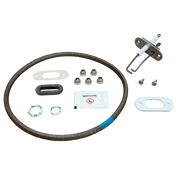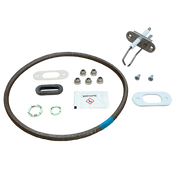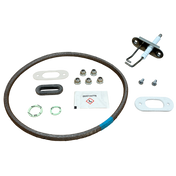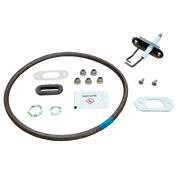Why Hydrogen Boilers?
Most UK homes use natural gas for domestic activities such as cooking and heating, this makes it nearly impossible for the heating and hot water industries to reduce carbon. As most UK greenhouse gases are from our homes, it is a big obstacle for the UK to meet its climate change goals. Using Hydrogen gas in place of natural gas boilers may be the easiest way to reduce the high emissions from the nation.
Hydrogen used as fuel is highly compressed and condensed. Water is the only by-product of Hydrogen gas, this means that it is free from any source of carbon and can help reduce heating and hot water emissions from our homes.

How Do Hydrogen Boilers Work?
Theoretically the size of a Hydrogen boiler is so small that it can fix into the available space of any traditional boiler. This swerves any headaches caused for homeowners to have to locate extra space for a bigger unit.
In recent years the market leader in boilers, Worcester Bosch, have been doing their utmost to proactively support the implementation of Hydrogen into heating. Not just by simply promoting Hydrogen use but also by designing and building a boiler model which can operate totally on Hydrogen Gas.
Not only that but the company have put together a prototype which will run efficiently with natural gas. Due to this development it means that homes who have a "hydrogen-ready" boiler can migrate over to Hydrogen smoothly in future providing Hydrogen gas becomes a viable alternative to traditional gas boilers. Resulting in homes not having to deal with the inconvenience of reinstalling a whole new heating system.
Existing gas pipelines and fittings would be suitable for the switch to Hydrogen, and it is safe for household use. In addition to this, it is expected that most household appliances would remain usable even if the switch were made today. This gives Hydrogen an enormous advantage. When drastic energy policies are decided they usually cost a huge amount of money to put into practice. This will often prevent green energy polices from becoming a reality. Low up front costs for Hydrogen mean that a greener future is much more likely.
Can I buy a Hydrogen boiler now?
Not just yet. Manufactures are currently working on prototypes so that boilers soon will be classed as hydrogen-ready, meaning that they are designed to run on either fuel type and they can be switched without too much hassle. Baxi and Worcester Bosch are pushing for all newly installed boilers to be Hydrogen-ready from 2025. Then, should the switch to Hydrogen be made it can continue to operate on 100% Hydrogen after a short visit from a heating engineer.
“Converting hydrogen-ready boilers from natural gas to Hydrogen is designed to be simple. When Hydrogen is turned on, only two or three small component changes will be necessary to make it suitable for 100% Hydrogen.” Martyn Bridges - Worcester Bosch
Why Do We Need An Alternative To Gas Central Heating?
Not only are fossil fuels running out, but the continued use of them is emitting greenhouse gases such as carbon into the atmosphere. These gases cannot escape our atmosphere, causing temperatures across the globe to rise which is changing our climate. It is different compared to other fuels which are considered primary energy sources, Hydrogen is used as a secondary energy source. This is because it does not occur in nature in its pure form; this must first be produced.
Pure Hydrogen as an energy source is:
- not explosive
- not self-igniting
- not subject to decay (such as acetylene)
- not oxidising
- not poisonous
- not corrosive
- not radioactive
As part of the worldwide climate emergency, the UK government is working towards reducing the country's carbon emissions. Specifically, the UK government has passed into law that, as a nation, our carbon emissions will be at net-zero by 2050.
Heating contributes to around a third of the UK's total carbon emissions. So, finding an alternative fuel and technology would reduce our carbon footprint significantly.









